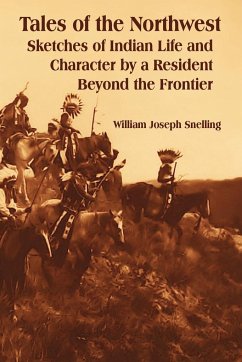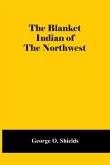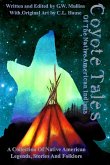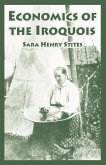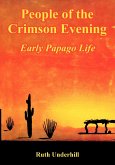This is a reprint of a book that is now extremely rare in collections of early American literature. Published anonymously in 1830, these "Sketches of Indian Life and Character" constituted one of the first collections of short tales to be brought out in the United States and also the first appearance in American Literature of the plains Indians. Fewer than a dozen copies of the Tales have been found after a careful search of American libraries. William Joseph Snelling, the author, wandered through the mid-western country in the 1820's, fraternizing with the Indians and penetrating their dark barriers as few other white men have ever done. His stories consequently bring to life real Indian-neither the "noble savages" of romantic fiction nor the bloodthirsty sadists of popular imagination. Snelling knew his Indian, and his writing about them, though fictional, is forthright and sincere. "In 1830 no American save Cooper wrote better narrative than Snelling at his peak," says John T. Flanagan, who has made an extensive study of the life and writings of Snelling and who writes the Introduction to this second edition of Tales of the Northwest. Seven of the ten tales deal with the relations between men and white. The other three are tales of Indians. All are written with a keen eye for the unique Indian psychology-the craving for justice inherent in an almost religious devotion to revenge, the scorn of pain and hardship, and the deep-seated oriental despair that more than anything else made the Indian incomprehensible to the insurgent whites. These traits Snelling brings out admirably in his stories, which tingle with the freshness and vigor of the Upper Mississippi country, where the author spent some of the richest years of his life. Son of Colonel Josiah Snelling, for whom Fort Snelling was named, young Joseph lived among the Indians or stayed with his father at the fort until in 1823 he joined Major Long's expedition to Lake Winnipeg, as interpreter between the explorers and the various Indian tribes they encountered. Returning to his native Boston in 1828, Snelling became the militantly outspoken editor of the Boston Herald, where he brought his crusading zeal into play against city grafters and gamblers and became an ardent member of the New England Anti-Slavery Society. He never went back to the Northwest, but immortalized the region and its peoples in his Tales of the Northwest, published under the modest pseudonym of "A Resident beyond the Frontier."
Hinweis: Dieser Artikel kann nur an eine deutsche Lieferadresse ausgeliefert werden.
Hinweis: Dieser Artikel kann nur an eine deutsche Lieferadresse ausgeliefert werden.

